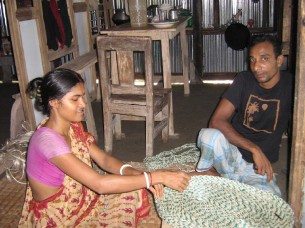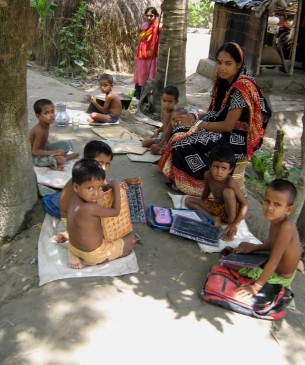Written 2/4/2006 During a trip to YWCA
To travel to Savar, about 30 kms from Dhaka the capital of Bangladesh is an interesting journey. Travelling anywhere in Bangladesh is an experience. There is utter chaos on the roads- cars, buses, rickshaws and the two seater open taxis all weaving in and around each other. There is the occasional policeman who puts his hand up, but no one takes any notice of him anyway. There is the occasional stop sign, but that is ignored too! The biggest vehicle seems to rule on the road. Car horns are constantly tooted and that seems to be the road rules. The rickshaw drivers have to stop immediately as the cars weave in and around them. But the Bengali people take it all in their stride- such is a day in Dhaka. To me I gave a sigh of relief whenever we reached our destination.
Leaving the noise and dust and pollution of Dhaka and driving out to the quietness of village life almost seems a relief. However the roads remain chaotic for the journey. It was with great excitement that one day we were taken by the YWCA staff to see the new village craft centre at Savar, about 30 kms from where we were staying in Dhaka. I had known of the YWCA dream for about three years to finance this new Craft Centre . It is now a partial reality. The Centre was opened November, 2005.
The dream evolved due to the concern of the YWCA staff that many of the producers from this village travelled into the YWCA Craft Centre in Dhaka by bus daily. This was a two hour journey each way. The dream was not to only create a local craft centre for these producers, but an all encompassing and forward thinking dream. At this centre there will also be built an aged peoples home ( something that is almost unheard of in Bangladesh ), so there will always be a home for YWCA staff and producers who do not have family. But the older people had better not think that they will have time to be idle because that is not the plan. A nursery and childrens centre is also going to be built for the producers children. The plan is that the older ladies will care for these children. And there is the fish pond/ dam where they will be able to catch their dinner. I suppose in time there will also be the vegetable gardens to tend.
It was expressed to us by Sabita, the General Secretary of the YWCA Bangladesh of their concern for an ambulance to transport sick people to Dhaka for treatment if necessary. We have taken this need to heart and are now fundraising for this other dream to become a reality.
When our vehicle arrived at the centre, it also meant a five minute walk down the village path to reach the entrance of the Craft Centre. Four impressive rooms have been built. One small one at the entrance , two craft sewing rooms and a health room. Every Tuesday the producers are visited by a health nurse. If needed all medication is provided free. There was recently an eye testing clinic. Six producers needed eye operations. Again all hospital expenses were paid by the YWCA. Next month the women are having gynaecological checkups.
When we visited it was very quiet as it was lunchtime. Most of the producers had gone back to their homes in the village to eat. Bengali people value their food so much that eating together is a very big occasion in their day.
The craft rooms at the centre looked so tidy and clean. The new treadle sewing machines took pride of place. Here the ladies can sit on platforms at tables to do their hand sewing. Different to the centre in Dhaka where the ladies sit on mats on the floor. There was a lot of activity going on – trucks were coming and going in preparation for the buildings yet to eventuate. But there was a feeling of tranquility here. There was a feeling of hope. This centre I feel is such a wonderful happening and has started to help and will continue to help so many women.
As mentioned in my last letter I want to share with you the story of one of the producers at the YWCA. Every producers story is special but for now I will be sharing with you about one producer. Her name is Mary Burmon .Her photo is attached ( the lady on the right )
Mary is deaf and she cannot speak. She was born into a very poor village family. Due to her physical disabilities and lack of education there were no opportunities for her to earn an income ( outside of begging and breaking bricks ) Mary has now been living at the YWCA hostel and working at the Craft Centre for 23 years . As well as the loving emotional support from the YWCA staff, Mary is able to earn an income . This income is sufficient to also support her widowed mother and two younger brothers. Her life now has hope and a purpose.
Behind every craft item there is a story. Just like Marys. When we are selling our craft items we are not only selling a wonderful unique handmade item , we are changing lives , we are giving dignity and hope to so many people. How better can it get!




